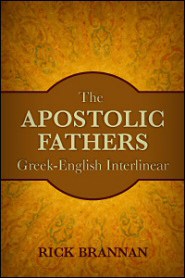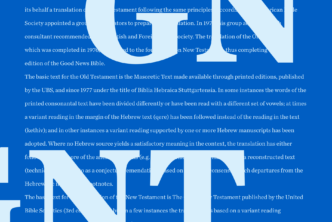So why would someone bother spending their time making an interlinear of something that isn’t part of the canon, like the Apostolic Fathers Greek-English Interlinear?
As I wrote in a previous post (The Importance of Historical Context), there came a point in my walk as a Christian where I realized that historical context is important. But it isn’t just historical context, it is context of all sorts. One area where I have found benefit is in linguistic similarity. That is, similarity of words, grammar and turns of phrase. In the scope of extant material in Greek, the New Testament is relatively small. Things that seem unique, out of place or unexpected in the New Testament suddenly become easier to explain amongst a wider linguistic milieu.
One instance that illustrates this is something that happened to me a few years back. Being convinced that really digging into writings contemporary with the NT would help me understand the NT better, I embarked on a study of First Timothy, stopping at just about every phrase, and looking up similar instances outside the New Testament, in stuff like Josephus, Philo, the Septuagint and the Apostolic Fathers.
At the time, I was working on 1 Timothy 4.16: “Take pains with yourself and your teaching, persist in them: for in doing this you will save both yourself and your hearers.” The language at the end of the verse seemed a little weird to me, both the sound of it and the possible ways to interpret it. So I began to dig in lexicons and commentaries, looking for citations. I didn’t have to dig too far. I found examples of similar language in the Apostolic Fathers — here are two examples:
And I do not think that I have given unimportant advice about self control. Whoever does it will not regret it, but also will save himself and I who advise him. For it is no small reward to return a wandering and perishing soul to salvation. (2Cl 15.1)
So then, brothers and sisters, with the God of truth, I am reading to you a request to pay attention to what is written, that you may save both yourselves and your reader. For the reward I ask you to repent with your whole heart, giving yourselves salvation and life. For having done this, we will set a goal for all the younger ones who desire to devote themselves to the piety and the goodness of God. (2Cl 19.1)
So, this idea about actions having an effect upon somebody and someone they were in some sort of relationship with isn’t an unknown idea, and these usages (and others!) outside of the NT show a similar conception. This doesn’t change our understanding of 1 Ti 4.16; it shows it that the idea of “both yourself and your hearers” is not a new thought, and that folks would likely pick it up just fine.
As I’ve worked through the Greek text of the Apostolic Fathers preparing the interlinear, I also added over 1300 notes, many of them cross-references to the OT and NT, so that reference searching in Logos would bring you right to relevant passages. If you reference search the Apostolic Fathers Greek-English Interlinear for 1 Ti 4.16, you’ll find the above two references (and two more that actually talk about condemnation instead of salvation).
But now, the work is done, and we’re very close to shipping it—on or around Oct 13, 2011. The retail price for the interlinear is $49.95; the price during this Pre-Pub period is less ($29.95 at time of posting). So if this kind of stuff interests you, then sign up for the Pre-Pub!





